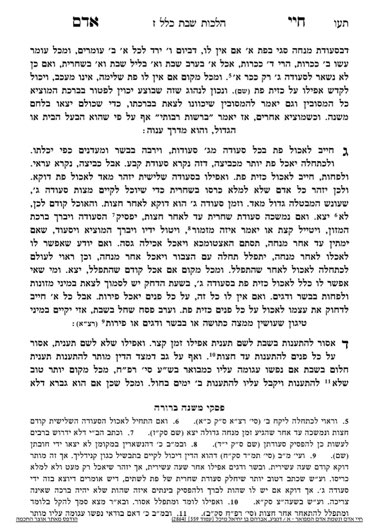The current series, which will cover seudos Shabbos and fasting on Shabbos, is available for sponsorship. Please contact Rabbi Reingold for more information.
We are continuing in sman 4, discussing the halachos of a taanis chalom. We learned that if a person has a bad dream, and it did not involve something they were thinking about during the recent few days, we are concerned it is a siman from shamayim and the best course of action is to fast.
A person should begin fasting from the moment they wake up, even if it is on Shabbos. The Gemara explains that it is muttar for a person to fast in this situation on Shabbos because they are obviously uncomfortable with the possible siman from shamayim that they are doing something wrong. If so, the person will receive more oneg Shabbos from fasting than from eating, so one is allowed to fast because it becomes their oneg Shabbos.
Nonetheless, the Gemara says that even when a person is allowed to fast, they must fast an additional time during the week as a kapparah for fasting on Shabbos and depriving themselves of the special Shabbos luxuries. We see that even though a taanis chalom is muttar on Shabbos, it is not fully muttar. Thus, the Chayei Adam writes that even though it is muttar to fast for the purpose of a taanis chalom on Shabbos, it is not muttar for any other reasons, even though one may feel good about the fasting for kapparah purposes.
The Gemara says that one does not need to be concerned about the bad dream if they do not take bad dreams seriously. If a person does take bad dreams seriously, then they should address the bad dream through fasting. Therefore. This whole discussion is only relevant if one feels concerned about the dream. Should a person feel compelled to fast on Shabbos, they must fast a second time during the week as a response to fasting on Shabbos.
With all of the above in mind, the Chayei Adam writes that it is still preferable not to fast on Shabbos, but rather to push off the fast to during the week. The person should fast for two days, one to replace the taanis chalom of shabbos, and one for the fast that they would have undertaken for fasting on shabbos. The two fasts do not have to be consecutive.
We mentioned before that fasting a taanis chalom is to be an immediate reaction to the bad dream, and there is a benefit to immediate fasting because it is an immediate response to this possible siman min hashamayim. The fasting is therefore only effective if it is immediate. If so, how can the Chayei Adam recommend pushing off the fast until during the week? One answer is that if a person is pushing off the taanis to show kavod for Shabbos, and not by ignoring the implications of the dream, the fact it is not immediate does not diminish the effectiveness of the fasting to mitigate the bad dream. However, for a dream dreamt during the week, one maust fast immediately, and if one does do so, they are showing that they don’t care to address the issue, while still being concerned about it. This lack of response undermines the efficacy of subsequent fasting.
The Gemara gives two other possible responses to a bad dream. One is to recite the bakasha of healing a bad dream while the kohanim are reciting birchas kohanim. This suggestion is more practical in Eretz Yisroel, where birchas kohanim is every day. The Shulchan Aruch points out that one should try to finish the bakasha with the kohanim, so that the amen of the tzibbur applies to his bakasha as well.
If no kohanim are present, the Shulchan Aruch writes that one can recite the bakasha while the chazzan is reciting elokeinu… barcheinu etc..
The third option is to gather three people who care about him, and create a bais din, which will determine and decree a positive interpretation of the dream. Since we know that the bais din in shamayim parallels the bais din down here, if bais din down here paskens the dream was good, hopefully bais din in shamayim will as well.
If, however, the person wishes to go the route of fasting, he should follow the course set above
Summary
- One should not fast on Shabbos, except a taanis chalom
- Other options for a bad dream is to say the bakasha in birchas kohanim or to convene a bais din. It is preferable to fast but also preferable not to fast on Shabbos.
- When one fasts on Shabbos for a taanis chalom, they must fast subsequently during the week as a kappara for fasting on Shabbos.
- When one pushes off the fast from Shabbos to the weekday, one fasts twice. The two fasts do not have to be consecutive.



